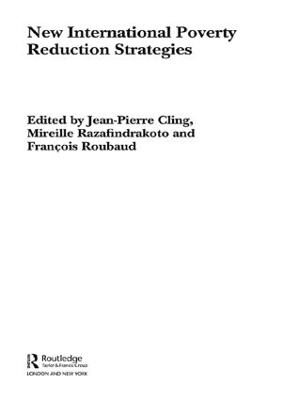
New International Poverty Reduction Strategies
Seiten
2006
Routledge (Verlag)
978-0-415-40694-9 (ISBN)
Routledge (Verlag)
978-0-415-40694-9 (ISBN)
Originally published in French and updated here for the first time in English, the book emphasises three main innovations brought about by the fight against poverty by the World Bank and the International Monetary Fund.
The World Bank and the International Monetary Fund (IMF) launched a joint initiative at the end of 1999, stating that they intended to set the fight against poverty at the heart of their development policies. This book provides the expert, critical analysis of the poverty reduction strategies that is needed. Originally published in French and updated here for the first time in English, the book emphasises three main innovations brought about by focus on poverty reduction, participatory process implemented for policy-making and better coordination of official development assistance.
The contributions also show that there remains a large gap between the principles of the World Bank and IMF's strategies and their application. That this valuable and insightful book will be of great interest to students and lecturers involved in development economics goes almost without saying. What also needs to be understood is that the lessons and policy implications drawn from the book need to be read and acted upon by those involved with the World Bank and the IMF.
The World Bank and the International Monetary Fund (IMF) launched a joint initiative at the end of 1999, stating that they intended to set the fight against poverty at the heart of their development policies. This book provides the expert, critical analysis of the poverty reduction strategies that is needed. Originally published in French and updated here for the first time in English, the book emphasises three main innovations brought about by focus on poverty reduction, participatory process implemented for policy-making and better coordination of official development assistance.
The contributions also show that there remains a large gap between the principles of the World Bank and IMF's strategies and their application. That this valuable and insightful book will be of great interest to students and lecturers involved in development economics goes almost without saying. What also needs to be understood is that the lessons and policy implications drawn from the book need to be read and acted upon by those involved with the World Bank and the IMF.
Jean-Pierre Cling is director of DIAL (Développement et Insertion Internationale) where Mireille Razafindrakoto and François Roubaud are both working economists.
Part I: Diagnosis and Reflections on Poverty Reduction Policies Part II: Scope and Limitations of the New International Initiatives Part III: Monitoring and Evaluation Systems
| Erscheint lt. Verlag | 1.8.2006 |
|---|---|
| Reihe/Serie | Routledge Studies in Development Economics |
| Verlagsort | London |
| Sprache | englisch |
| Maße | 156 x 234 mm |
| Gewicht | 589 g |
| Themenwelt | Sozialwissenschaften ► Soziologie |
| Wirtschaft ► Volkswirtschaftslehre ► Makroökonomie | |
| ISBN-10 | 0-415-40694-3 / 0415406943 |
| ISBN-13 | 978-0-415-40694-9 / 9780415406949 |
| Zustand | Neuware |
| Haben Sie eine Frage zum Produkt? |
Mehr entdecken
aus dem Bereich
aus dem Bereich
Volkswirtschaftslehre für eine sich ändernde Welt
Buch | Hardcover (2024)
De Gruyter Oldenbourg (Verlag)
44,95 €
Kompakt und prüfungsrelevant für Wirtschaftswissenschaftler
Buch | Softcover (2021)
Vahlen, Franz (Verlag)
11,90 €
Makroökonomie, Wirtschaftspolitik und nachhaltige Entwicklung
Buch | Hardcover (2022)
Vahlen (Verlag)
49,80 €


